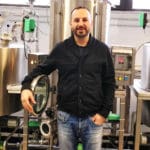Environmental sustainability in breweries
28/05/2024 09:00 Room 3.1 EBC Congress

The energy puzzle - how GEAs new wort boiling system can support brewers on reaching their sustainability targets
Speaker: Mark Schneeberger
WITHDRAWN - Daniel Heller of GEA will present
GEA Brewery Systems
In the context of the brewing industry’s increasing focus on sustainability, this presentation introduces an innovative wort boiling system developed by GEA. This system transforms the conventional batch process into a fed batch approach, integrating fractionated wort treatment and a rectification system.
Addressing the critical need to reduce thermal energy demand, this technology achieves significant results by minimizing total evaporation during wort boiling to below 1%. Notably, GEA’s system demonstrates outstanding energy efficiency, reducing energy consumption by min. 30% in comparison to systems utilizing energy storage by means of hot water.
The presentation will delve into the operational intricacies of this system, exploring the synergy between fractionated wort treatment and rectification processes. Additionally, the impact on wort characteristics and beer quality, including sensory profiles, will be comprehensively shown.
GEA’s wort boiling system offers breweries a practical and effective solution to enhance energy efficiency, reduce environmental impact, and improve the quality of their products, contributing to the industry´s sustainability goals.

Martens Brewery case study Water-as-a-Service
Speaker: Joris Moors
Brewery Business Lead
Waterleau Group NV
The Martens brewery in Belgium experienced strong growth even despite the pandemic. With an annual production of 4 million hectoliters, the brewery is now the second largest in Belgium. The highly automated site in Kaulille using a continuous brewing process was commissioned in 2007. Since commissioning, the brewing capacity has been steadily and significantly expanded overall. The existing wastewater treatment plant was bursting at the seams. A technical and structural adjustment of the plant became necessary.
New strategic thinking led to a surprising out-of-the-box approach, with Waterleau now becoming the long-term partner of Martens brewery.
The brewery focuses primarily on adding value from the brewing know-how. They invest primarily in production and outsource the water management to a specialist at an agreed price per cubic meter. Martens Brewery and Waterleau quickly found each other in a pioneering approach where each party focuses on its core business.
Martens brewery asked for the project to be implemented without being involved in the financing itself. Waterleau conducts the project on a 10-year water-as-a-service model.

A sustainable valorisation of spent hops from dry-hopping
Speaker: Giovanni De Francesco
Department of Agriculture, Food and Environmental Science, University of Perugia
The study aimed to evaluate the non-volatile and volatile compounds retained in the spent hop (SH) and their brewing potential carrying out brewing tests at laboratory and pilot scale with SH and fresh hops (FH).
The SH, after dry-hopping (DH), was collected and stored under vacuum at -25 °C before analysis. The volatile compounds of hop oil and the hop-derived aroma compounds in wort and beer were determined. Also, sensory analysis and triangle test was performed by a trained panel.
The extraction efficiency during static DH was low (18.8%) and SH still contains a significant amount of hop oil. The SH showed on average lower monoterpenes and terpene alcohols content than FH, while sesquiterpenes were similar.
The use of SH in wort production at the pilot scale underlined no differences in α-acids isomerization rate compared with FH. The beers, similar to the main qualitative parameters, showed differences in the polyphenol content and in the amount and composition of the hop volatile compounds. The sensory evaluation did not highlight significant differences between samples, as confirmed by the triangle test. Results clearly indicate the suitability of SH for brewing purposes.

Heat Pump Solutions for Process Industries: An unbiased review of this technology application in breweries
Speaker: Jacob Friis
NIRAS A/S
Heat pumps have emerged as a promising energy-efficient technology for various industrial applications, including the process industries of food and beverage.
By highlighting successful case studies from different industries and identifying scenarios where heat pumps is more applicable, NIRAS goal is to assess the relevance and efficiency of heat pump solutions for a more energy-efficient and environmentally friendly future in brewing notably.
NIRAS aims to present findings for the potential of heat pumps to revolutionize thermal management while achieving sustainability objectives. Factors such as temperature requirements, scalability, and economic viability are thoroughly evaluated to determine feasibility for heat pump integration in the brewing industry. We analyze benefits like improved thermal control and cost savings while also addressing limitations like temperature conditions and additional needs for supplementary systems.
By presenting unbiased perspectives, we equip brewing stakeholders with insights to make informed decisions about heat pump integration in this dynamic industry.

